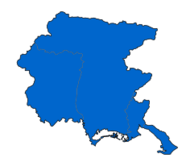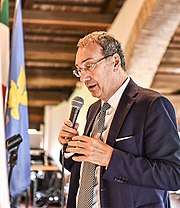2018 Friuli-Venezia Giulia regional election
The Friuli-Venezia Giulia regional election of 2018 took place on 29 April 2018, to elect the President and the Regional council of the Italian autonomous region of Friuli-Venezia Giulia.[1]
| |||||||||||||||||||||||||||||||||||||
All 49 seats to the Regional Council | |||||||||||||||||||||||||||||||||||||
|---|---|---|---|---|---|---|---|---|---|---|---|---|---|---|---|---|---|---|---|---|---|---|---|---|---|---|---|---|---|---|---|---|---|---|---|---|---|
| Turnout | 49.65% | ||||||||||||||||||||||||||||||||||||
| |||||||||||||||||||||||||||||||||||||
 Map of the results of the regional election. Colors identify the candidate who received a plurality in each province. Blue indicates a Fedriga majority. | |||||||||||||||||||||||||||||||||||||
| |||||||||||||||||||||||||||||||||||||
The election saw a large victory of the centre-right candidate, Massimiliano Fedriga, with more than 57% of votes and a great showing of the League, followed by the centre-left candidate Sergio Bolzonello, who arrived second with almost 27% of votes, and the Five Star one, who gained less than 12% of votes.[2][3]
Background
In the 2013 regional election, the centre-left candidate, Debora Serracchiani, a Socialist MEP and regional leader of the Democratic Party (PD), narrowly defeated incumbent Renzo Tondo of The People of Freedom (PdL) 39.39% to 39.00%; Saverio Galluccio of the Five Star Movement (M5S) came third with 19.2% of the vote. Serracchiani was the second woman to hold the office of President of Friuli-Venezia Giulia, after Alessandra Guerra of Lega Nord Friuli (LNF) in 1994–1995.[4]
However in 2017 Serracchiani announced her intention not to seek a re-election and the centre-left selected Sergio Bolzonello, former mayor of Pordenone, as the candidate for the presidency.[5][6] The centre-right coalition choose Massimiliano Fedriga, a member of the Chamber of Deputies for the League and a close ally of Matteo Salvini, as its candidate;[7] while the Five Star Movement's candidate was Alessandro Fraleoni Morgera, a former member of the right-wing party, National Alliance.[8] The former mayor of Udine, Sergio Cecotti, run as an independent at the head of an autonomist list.[9]
Parties and candidates
| Political alliance | Constituent lists | Leader | ||
|---|---|---|---|---|
| Centre-right coalition | League (Lega) | |||
| Forza Italia (FI) | ||||
| Brothers of Italy (FdI) | ||||
| FVG Project | ||||
| Responsible Autonomy (AR) | ||||
| Centre-left coalition | Democratic Party (PD) | |||
| Citizens for Bolzonello President | ||||
| Open – Left FVG | ||||
| Slovene Union (SS) | ||||
| Five Star Movement (M5S) | ||||
| Pact for Autonomy (PpA) | ||||
Opinion polling
This section reports in chronological order the data of the electoral surveys related to this election. The percentages attributed to the candidates are relative to the part of the sample that expresses a voting intention.
| Date | Polling firm | Fedriga | Bolzonello | Fraleoni Morgera | Cecotti | Undecided | Lead |
|---|---|---|---|---|---|---|---|
| 14 April 2018 | SWG | 47–51 | 26–30 | 18–22 | 2–4 | 21 | 25–17 |
| 8 April 2018 | Demopolis | 45–51 | 22–28 | 21–27 | 1–5 | 20 | 29–17 |
Results
 | |||||||||
| Candidates | Votes | % | Seats | Parties | Votes | % | Seats | ||
|---|---|---|---|---|---|---|---|---|---|
| Massimiliano Fedriga | 307,123 | 57.09 | 1 | ||||||
| League | 147,464 | 34.87 | 17 | ||||||
| Forza Italia | 51,234 | 12.11 | 5 | ||||||
| FVG Project | 26,596 | 6.29 | 3 | ||||||
| Brothers of Italy | 23,128 | 5.47 | 2 | ||||||
| Responsible Autonomy | 16,802 | 3.97 | 1 | ||||||
| Total | 265,224 | 62.71 | 28 | ||||||
| Sergio Bolzonello | 144,363 | 26.84 | 1 | ||||||
| Democratic Party | 76,579 | 18.11 | 9 | ||||||
| Citizens for Bolzonello President | 17,297 | 4.09 | 2 | ||||||
| Open – Left FVG | 11,715 | 2.77 | 1 | ||||||
| Slovene Union | 4,895 | 1.16 | 1 | ||||||
| Total | 110,486 | 26.12 | 13 | ||||||
| Alessandro Fraleoni Morgera | 62,776 | 11.67 | – | Five Star Movement | 29,862 | 7.06 | 4 | ||
| Sergio Cecotti | 23,696 | 4.40 | – | Pact for Autonomy | 17,350 | 4.10 | 2 | ||
| Total candidates | 537,958 | 100.00 | 2 | Total parties | 422,922 | 100.00 | 47 | ||
| Source: Region of Friuli-Venezia Giulia. | |||||||||
Analysis
Similar to the election in Molise, the M5S lost almost 20% of votes compared to the general election. On March 4, they reached almost 25%,[10] but now just over 7%. By contrast, the centre-right coalition gained more than 20% compared to March 4.[10]
References
- Elezioni regionali 2018 in Friuli Venezia Giulia, tutti i candidati, UdineToday, 26 March 2018.
- Voto in Friuli Venezia Giulia, Fedriga vola con il 56 per cento verso la vittoria. Crolla il M5s
- Elezioni Friuli Venezia Giulia, i risultati dello spoglio: Fedriga oltre il 50%, crollo del M5S
- http://rulers.org/italreg.html
- Serracchiani non si ricandida alla presidenza del Friuli: "Torno a Roma"
- Elezioni Friuli Venezia Giulia 2018. Chi è Sergio Bolzonello, candidato del Pd : “Discontinuità nella continuità”
- "Friuli, chi è il candidato del centrodestra Massimiliano Fedriga". Archived from the original on 2018-04-30. Retrieved 2018-04-30.
- Elezioni Friuli Venezia Giulia 2018. Chi è Alessandro Fraleoni Morgera: “Serracchiani ha distrutto il sistema sanitario regionale”
- Cecotti si candida alla guida del FVG
- Circoscrizione FRIULI-VENEZIA GIULIA


